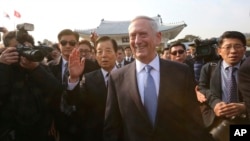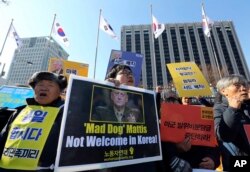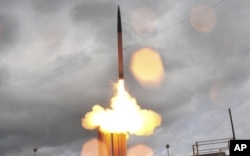U.S. Defense Secretary James Mattis emphasized America's commitment to support its allies in Asia against the growing North Korean nuclear threat during his visit to South Korea this week, while sidestepping the divisive issue of defense sharing costs.
"Any attack on the United States, or our allies, will be defeated, and any use of nuclear weapons would be met with a response that would be effective and overwhelming," said Mattis during a visit to South Korea's defense ministry on Friday.
Mattis and his counterpart, South Korean Defense Minister Han Minkoo, met privately on Friday in Seoul and made brief statements to the press at the conclusion of their talks.
"Secretary Mattis' visit to South Korea and the meeting show our determined will to respond to North Korea's nuclear and missile threats. And this will be the strongest warning to North Korea," said the South Korean defense minister.
Nuclear North
President Donald Trump's defense secretary made Northeast Asia his first overseas trip to stress the importance of maintaining the longstanding U.S. alliances with South Korea and Japan, and to reaffirm the U.S. commitment to provide "extended deterrence," the guarantee that U.S. armed forces would help counter any North Korean attack on its allies with the vast U.S. arsenal of conventional weapons and even tactical nuclear weapons.
North Korean leader Kim Jong Un has made clear his government's ambition to achieve a credible nuclear deterrence and be accepted into the international community as a nuclear state. Increasing international sanctions have failed to deter Pyongyang from intensifying its development efforts, with two nuclear tests and 24 missile launches in the last year.
During his New Year's message, Kim Jong Un said his country was prepared to openly test an inter-continental ballistic missile that has the potential to reach the U.S. mainland. The then President-elect Trump in a tweet said the launch will not happen.
The North appears to have also re-started operation of a reactor at its main Yongbyon nuclear facility that produces plutonium that can be used for its nuclear weapons program, according to U.S. think tank 38 North.
Free riders
The defense secretary did not address President Trump's past statements that introduced an element of doubt about the reliability of U.S. security commitments.
During the campaign, Trump suggested he might withdrawal troops and allow allies to procure their own nuclear weapons to defend themselves, unless they agree to pay significantly more for American protection. And in his inaugural address, the president vowed to change U.S. policies that, "subsidized the armies of other countries while allowing for the very sad depletion of our military."
However President Trump has indicated that he holds in high regard the views and counsel of his defense secretary, who is a retired Marine Corps general and decorated war veteran, and has been nicknamed "Mad Dog" for his blunt style of speaking.
On the issue of torture, the president said he will support Mattis's position that it does not work and is counter-productive, even though Trump has said he personally believes enhanced interrogation techniques do work.
Mattis's visit to South Korea and Japan and his strong support for regional U.S. alliances has reassured many that he will uphold the United States' military commitment.
"According to what Secretary Mattis said in his hearings and his comments in past, he is a person who belongs to the typical alliance faction and has a traditional view on security," said Koh Myung-hyun, a researcher at the Asan Institute in Seoul.
Even if a contentious dispute arises over defense costs, regional security analyst Daniel Pinkston with Troy University in Seoul said he expects future negotiations over the defense sharing cost agreement to be handled over time and in a non-disruptive way.
"As far as tearing that up right now, restarting negotiations on that right now or approaching this in some way that's going to totally blow up the alliance relationship, things that have already been negotiated and planned in the military exercise cycle and all of those things, that's not going to happen," he said.
THAAD
The U.S. defense secretary and the South Korean defense minister this week also voiced support for deploying the Terminal High Altitude Area Defense (THAAD) U.S. missile defense system in South Korea later this year.
Mattis said its sole purpose is to defend against a North Korean attack.
China objects to THAAD on the basis that its powerful radar can be used to monitor other countries in the region and that the advanced weapons system will further destabilize the regional security balance.
However the current conservative South Korean government may not be in a position to make good on its promise to deploy THAAD. Opposition leaders who argue deploying THAAD is not worth the price of alienating China could soon take over the presidency.
The South Korean National Assembly recently impeached President Park Geun-hye for her alleged involvement in an influence peddling scandal. If the Constitution Court rules to uphold the move, a new presidential election will be held in the near future.
Youmi Kim in Seoul contributed to this report.







